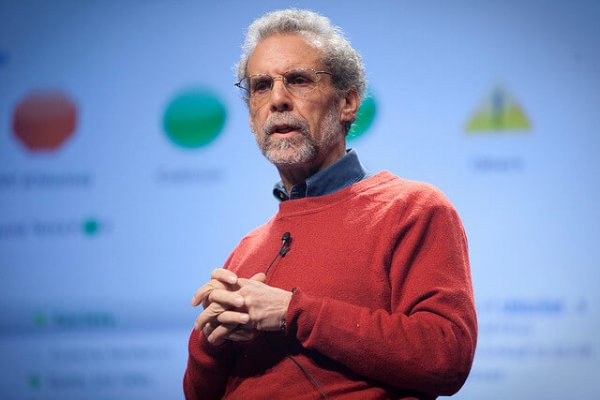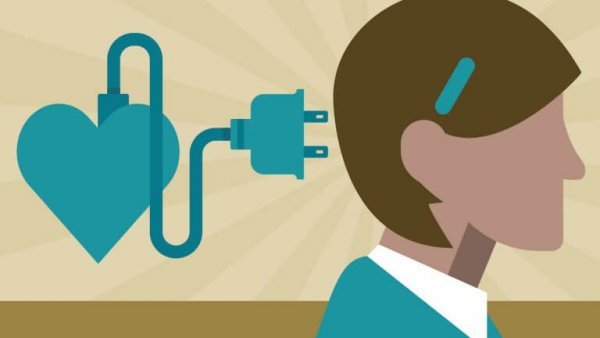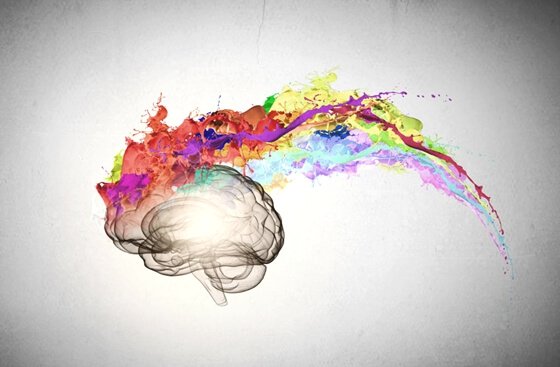Daniel Goleman and His Theory on Emotional Intelligence


Written and verified by the psychologist Valeria Sabater
A brilliant brain and a high IQ are rather useless if we do not understand empathy. If we don’t know how to read our own emotions (and other people’s emotions), if we are strangers to our own heart and lack social awareness that allows us to connect, manage fear, and be assertive… Emotional intelligence is, whether we like it or not, the real key to being happy.
The debate about what is and is not intelligence appears to be ongoing. Empirical evidence confirms, for example, the existence of Spearman’s “G” factor, understood as a basic and essential foundation that defines all intelligent behavior.
We also have the triarchic theory of Robert J. Sternberg, and of course, Howard Gardner’s popular focus on multiple intelligences.
“The key to achieving a high collective intellectual quotient is social harmony”
-Daniel Goleman-
Where then is the so-called “emotional intelligence” of Daniel Goleman? Well actually you may be interested to know that the essence of this idea has always been there throughout the history of psychology.
Emotional intelligence over the years
Professor Goleman did not formulate it, he only popularized it in 1995 in his book “Emotional Intelligence”, which has already sold more than 5 million copies.
For example, as early as 1920, Edward L. Thorndike described what he called “social intelligence”, that basic ability to understand and motivate other people. Then in the 1940’s, David Wechsler made it clear that no intelligence test could be valid if emotional aspects were not taken into account.
Later, Howard Gardner himself would lay the first a foundation with the seventh of his intelligences, so-called interpersonal intelligence, which is undoubtedly very similar to emotional intelligence.
However, it was in 1985 when the term “emotional intelligence” appeared for the first time, in Wayne Payne’s doctoral thesis, entitled “A study of emotions: the development of emotional intelligence”.
Just 10 years later, an American psychologist and journalist named Daniel Goleman began something that’s still going on today. It helps us understand what a great power emotions have over what we are, what we do and how we relate.

Daniel Goleman and Emotional Intelligence
Daniel Goleman started as a journalist at The New York Times and is today the guru of Emotional Intelligence. He is now in his 70’s, his serene smile and penetrating gaze still powerfully holding our attention.
It’s like he’s always been able to see further than the rest of us, a man who doesn’t miss details, who finds connections where the rest of us see only coincidences.
He always says that his passion for psychology came from his mother, a social worker specializing in psychiatry. She accumulated books on neuroscience, the human mind and the behavioral sciences. Those books formed his childhood and daily life.
For a time they were little more than indecipherable texts he read with inexplicable fascination. But later, they became his motivation and a path to who he is now: the greatest popularizer of social intelligence.
What actually is emotional intelligence?
It’s a way of seeing intelligence beyond its cognitive aspects (like memory and problem-solving). We are talking primarily of our capacity to effectively address others and ourselves, to connect with our emotions, to manage them, to self-motivate, to put the brakes on our impulses, to overcome frustrations…
Goleman explains that there are four basic dimensions within his approach to emotional intelligence:
- The first is self-awareness. It refers to our ability to understand what we feel. To be connected to our values, to our essence.
- The second aspect is self-motivation and our ability to orient ourselves towards our goals, to recover from setbacks, to manage stress.
- The third has to do with social awareness and empathy.
- The fourth link is undoubtedly the philosopher’s stone of Emotional Intelligence: our ability to relate, to communicate, to reach agreements, to connect positively and respectfully with others.

Daniel Goleman reminds us in his books of the need to be proficient in these four areas. Otherwise you get, for example, a person trained in Emotional Intelligence but who has only reached self-awareness, not the ability to empathize with others. We should therefore see these four areas as a whole.
Emotional intelligence is learned and can be improved
In his books “Emotional Intelligence” (1995) and “Social Intelligence” (2006), the author explains that part of this ability, this capacity, is to be found in our own epigenetics. That is, it can be activated and deactivated, depending on the emotional and social environment we grow up in.
“In the best of cases, the CI seems to contribute only 20% of the factors which determine success”
-Daniel Goleman-
However, and herein lies the real magic, Emotional Intelligence also has to do with the plasticity of our brain, where stimuli, continuous practice and systematic learning create changes and makes connections. We can become much more proficient in each of the 4 areas mentioned above.

Daniel Goleman also points out the need to raise children accordingly. On the other hand, as far as the adult world is concerned, we know that there is no shortage of seminars, books, and other kinds of training.
Specifics on emotional intelligence
It’s a matter of will and perseverance to apply the keys that Professor Goleman writes about:
- We must detect the emotion behind each of our actions.
- We need to expand our emotional language (sometimes it’s not enough to say “I’m sad“, we have to be more specific. “I’m sad because I feel disappointed, somewhat angry and confused at the same time”).
- Control what you think in order to control how you behave.
- Look for a reason behind the behavior of others, be able to understand the points of view and emotions of others.
- Express your emotions assertively.
- Improve your social skills.
- Learn to self-motivate and fight for things that can bring you closer to true happiness.
To conclude, there is more to intelligence than IQ, and success depends on all of it. We’re talking about personal success where we connect better with others, where we live in balance and harmony feeling capable, free, happy and personally fulfilled. It’s an adventure!
Bibliographic References:
-Daniel Goleman (1996) Inteligencia Emocional. Madrid: Kairós
-Daniel Goleman (2012) El cerebro y la Inteligencia Emocional. Barcelona: Ediciones B
A brilliant brain and a high IQ are rather useless if we do not understand empathy. If we don’t know how to read our own emotions (and other people’s emotions), if we are strangers to our own heart and lack social awareness that allows us to connect, manage fear, and be assertive… Emotional intelligence is, whether we like it or not, the real key to being happy.
The debate about what is and is not intelligence appears to be ongoing. Empirical evidence confirms, for example, the existence of Spearman’s “G” factor, understood as a basic and essential foundation that defines all intelligent behavior.
We also have the triarchic theory of Robert J. Sternberg, and of course, Howard Gardner’s popular focus on multiple intelligences.
“The key to achieving a high collective intellectual quotient is social harmony”
-Daniel Goleman-
Where then is the so-called “emotional intelligence” of Daniel Goleman? Well actually you may be interested to know that the essence of this idea has always been there throughout the history of psychology.
Emotional intelligence over the years
Professor Goleman did not formulate it, he only popularized it in 1995 in his book “Emotional Intelligence”, which has already sold more than 5 million copies.
For example, as early as 1920, Edward L. Thorndike described what he called “social intelligence”, that basic ability to understand and motivate other people. Then in the 1940’s, David Wechsler made it clear that no intelligence test could be valid if emotional aspects were not taken into account.
Later, Howard Gardner himself would lay the first a foundation with the seventh of his intelligences, so-called interpersonal intelligence, which is undoubtedly very similar to emotional intelligence.
However, it was in 1985 when the term “emotional intelligence” appeared for the first time, in Wayne Payne’s doctoral thesis, entitled “A study of emotions: the development of emotional intelligence”.
Just 10 years later, an American psychologist and journalist named Daniel Goleman began something that’s still going on today. It helps us understand what a great power emotions have over what we are, what we do and how we relate.

Daniel Goleman and Emotional Intelligence
Daniel Goleman started as a journalist at The New York Times and is today the guru of Emotional Intelligence. He is now in his 70’s, his serene smile and penetrating gaze still powerfully holding our attention.
It’s like he’s always been able to see further than the rest of us, a man who doesn’t miss details, who finds connections where the rest of us see only coincidences.
He always says that his passion for psychology came from his mother, a social worker specializing in psychiatry. She accumulated books on neuroscience, the human mind and the behavioral sciences. Those books formed his childhood and daily life.
For a time they were little more than indecipherable texts he read with inexplicable fascination. But later, they became his motivation and a path to who he is now: the greatest popularizer of social intelligence.
What actually is emotional intelligence?
It’s a way of seeing intelligence beyond its cognitive aspects (like memory and problem-solving). We are talking primarily of our capacity to effectively address others and ourselves, to connect with our emotions, to manage them, to self-motivate, to put the brakes on our impulses, to overcome frustrations…
Goleman explains that there are four basic dimensions within his approach to emotional intelligence:
- The first is self-awareness. It refers to our ability to understand what we feel. To be connected to our values, to our essence.
- The second aspect is self-motivation and our ability to orient ourselves towards our goals, to recover from setbacks, to manage stress.
- The third has to do with social awareness and empathy.
- The fourth link is undoubtedly the philosopher’s stone of Emotional Intelligence: our ability to relate, to communicate, to reach agreements, to connect positively and respectfully with others.

Daniel Goleman reminds us in his books of the need to be proficient in these four areas. Otherwise you get, for example, a person trained in Emotional Intelligence but who has only reached self-awareness, not the ability to empathize with others. We should therefore see these four areas as a whole.
Emotional intelligence is learned and can be improved
In his books “Emotional Intelligence” (1995) and “Social Intelligence” (2006), the author explains that part of this ability, this capacity, is to be found in our own epigenetics. That is, it can be activated and deactivated, depending on the emotional and social environment we grow up in.
“In the best of cases, the CI seems to contribute only 20% of the factors which determine success”
-Daniel Goleman-
However, and herein lies the real magic, Emotional Intelligence also has to do with the plasticity of our brain, where stimuli, continuous practice and systematic learning create changes and makes connections. We can become much more proficient in each of the 4 areas mentioned above.

Daniel Goleman also points out the need to raise children accordingly. On the other hand, as far as the adult world is concerned, we know that there is no shortage of seminars, books, and other kinds of training.
Specifics on emotional intelligence
It’s a matter of will and perseverance to apply the keys that Professor Goleman writes about:
- We must detect the emotion behind each of our actions.
- We need to expand our emotional language (sometimes it’s not enough to say “I’m sad“, we have to be more specific. “I’m sad because I feel disappointed, somewhat angry and confused at the same time”).
- Control what you think in order to control how you behave.
- Look for a reason behind the behavior of others, be able to understand the points of view and emotions of others.
- Express your emotions assertively.
- Improve your social skills.
- Learn to self-motivate and fight for things that can bring you closer to true happiness.
To conclude, there is more to intelligence than IQ, and success depends on all of it. We’re talking about personal success where we connect better with others, where we live in balance and harmony feeling capable, free, happy and personally fulfilled. It’s an adventure!
Bibliographic References:
-Daniel Goleman (1996) Inteligencia Emocional. Madrid: Kairós
-Daniel Goleman (2012) El cerebro y la Inteligencia Emocional. Barcelona: Ediciones B
All cited sources were thoroughly reviewed by our team to ensure their quality, reliability, currency, and validity. The bibliography of this article was considered reliable and of academic or scientific accuracy.
- Daniel Goleman (1996) Inteligencia Emocional. Madrid: Kairós
- Daniel Goleman (2012) El cerebro y la Inteligencia Emocional. Barcelona: Ediciones B
This text is provided for informational purposes only and does not replace consultation with a professional. If in doubt, consult your specialist.







